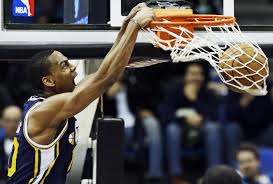In an offseason filled with player movement left and right, possibly the biggest move the Nets made was buying out the contract of Deron Williams, who, in 2011, was acquired by the team with the thoughts of him becoming the franchise’s next Jason Kidd. Safe to say that didn’t work out as well as planned.
Deron, thanks to endless injury issues as well as his constant clashes with coaches and objectively bad attitude, never panned out in New Jersey or Brooklyn, leading general manager Billy King to cut ties with the former All-Star. That left the team on the hook for an estimated $25 to $30 million of Williams’ remaining contract. It also left Brooklyn with an uninspiring group of potential replacements at the point
As of right now, veteran Jarrett Jack — who has been a fringe starter for most of his career — is the team’s No. 1 at point guard and will start the regular season — which begins on Wednesday — getting the lion’s share of minutes at that position. Jack, picked up by the Nets with Sergey Karasev from the Cavaliers in the Marcus Thornton trade from last offseason, was decent for the Nets last year but is not liked by most advanced statistical measures such as PER (his 14.6 from last season is below league-average) and usage rate (22.6, just below that of Chris Paul).
Those two stats show that Jack is 1) not very efficient on offense and 2) prone to taking up way too many possessions. Whether it’s ill-advised mid-range jumpers, turnovers or the occasional three (Jack shot a putrid 26.7 percent from deep in 2014-15), his problem is controlling his scoring attempts and determining when he should get the ball to his teammates or try to score himself. While the Nets don’t have a ton of scoring options, they certainly don’t need Jack taking up almost a quarter of Brooklyn’s possessions when he’s on the floor.
Shane Larkin, signed by the Nets this summer away from the Knicks, is the likely backup to Jack and could — potentially — replace Jack should he underperform in the beginning of the season. A third-year pro who is a former first-round pick, Larkin had a falling out with Knicks’ management — specifically Phil Jackson — after last season and should enter this season with a major chip on his shoulder.
Larkin doesn’t have much size and isn’t great at creating his own shot, but his speed and ability to run an offense smoothly with limited mistakes made his preseason a very impressive one. He also displayed solid defensive skills, especially in terms of forcing turnovers. His main issue is shooting, as he has yet to make threes at a clip higher than 31 percent in his young career. He’s not bad in mid-range (made 43 percent of his attempts from 10-16 feet from basket in 2014-15) but once he goes beyond the arc, his efficiency plummets.
Three-point shooting isn’t the most important thing for a point guard, but having a capable long-range shooter at the 1 forces the defender to pick the point guard up at the top of the key, which should open up the free throw line area for frontcourt players.
Brooklyn’s other option at the point is journeyman Donald Sloan, who saw inconsistent playing time during the preseason but has a decent body of NBA work for the coaching staff to base its assessments of him off. Sloan is a bigger guard — stands at 6-3 compared to Larkin’s 5-11 frame — but is less athletic than the 23-year-old son of MLB Hall of Famer Barry Larkin.
Sloan is also a poor three-point shooter (career 28 percent from downtown) but is probably a stronger finisher at the hoop than Larkin and is a better passer (career 25.4 assist percentage). However, his lack of speed is an issue for a Nets second unit that will probably try to get up and down the floor in transition often to offset its relative lack of size and physicality.
That’s why it seems likely that some mixture of all three — Jack, Larkin and Sloan — will be used by Lionel Hollins each night to piece together his point guard position. Considering how Markel Brown is out with an oblique injury for an uncertain amount of time, Sloan could be used along with Larkin as a smaller shooting guard to shoehorn a Brooklyn small-ball lineup at certain points. The differences between the three allow for a lot of versatility at the point, which wasn’t possible when Deron Williams was still in the fold.
Clearly, the Nets would rather have an established and productive starting point guard running the first-team offense as opposed to a career glue guy in Jack, but, buoyed by Larkin and Sloan, he should be able to play well enough to stem the tide. Teams with bigger and more explosive guys at the 1 — the Raptors’ Kyle Lowry and Cavaliers’ Kyrie Irving come to mind — will be problematic for Brooklyn but who’s expecting this team to be a world-beater anyway?
Add The Sports Daily to your Google News Feed!
